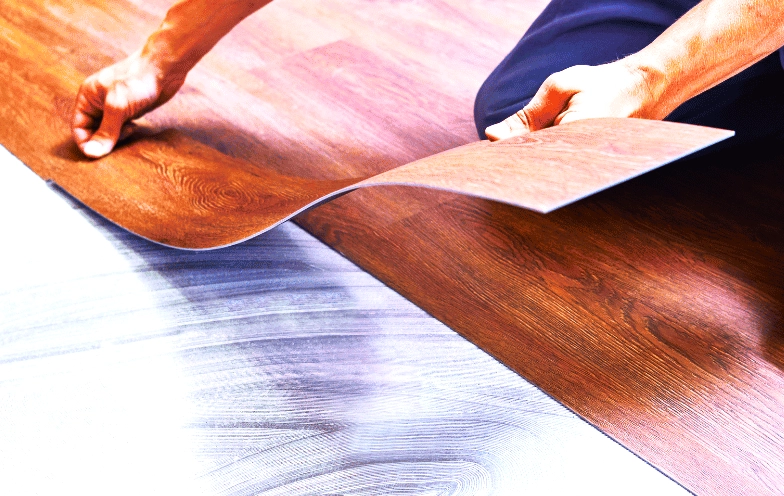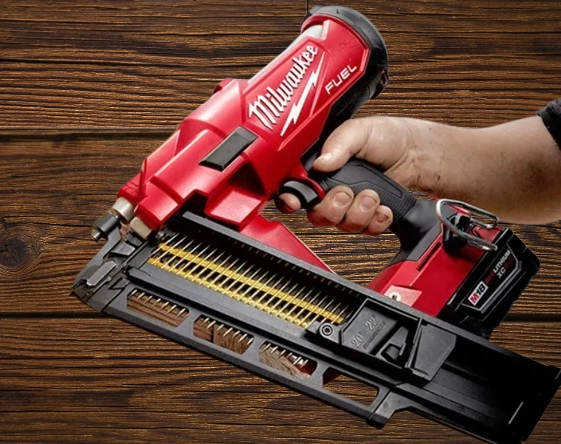Glue Seeping Through Vinyl Flooring

Vinyl flooring has been a common choice for many homeowners for many years. Vinyl is easy to maintain, long-lasting, and water-resistant, in contrast to other flooring materials.
Additionally, vinyl floors come in a variety of designs. Installing a vinyl floor is a reasonably simple process.
You might, however, run into a few difficulties. For example, during or after installation, you might notice glue leaking through the vinyl floor.
I’ll outline the reasons why glue seeps through vinyl floors in this post, along with some solutions, in case you’ve encountered the aforementioned circumstance.
Is It Possible for Glue to Permeate Vinyl Flooring?
It can, of course. Glue seeping through a vinyl floor can leave yellow residue on the seams and edges.
A common issue is glue leaking through vinyl flooring. The good news is that it can be easily fixed and prevented.
Because bleeding glue stains can seriously detract from the appearance of your floor, you should get rid of them as soon as you notice them.
The Reasons Behind Glue Seeping Through Vinyl Flooring?
There are a number of reasons why glue might seep through a vinyl floor. Among them are
- The subfloor is the source of moisture.
Installing vinyl plank flooring requires an understanding of the critical role moisture plays in adhesive seepage. Adhesive integrity may be compromised by moisture that is introduced from below due to subfloor problems or from above through spills and cleaning procedures.
By speaking with a flooring contractor about moisture-related issues early on, you can stop adhesive seepage and protect the flooring’s longevity and aesthetic appeal.
Taking preventative measures guarantees that your vinyl flooring will continue to be attractive and useful for many years to come.
- Excessive Glue Use During Installation
Excessive use of glue during installation is another reason why it may seep through a vinyl floor.
I can appreciate the temptation to use a lot of glue when installing vinyl flooring. It is assumed that better adhesion is guaranteed when more glue is used. That isn’t always the case, though.
Laying a vinyl floor does not require soaking the subfloor in glue. Maximum adherence between the vinyl and the Subfloor can be achieved by using an adequate amount of glue. If too much glue is applied, some of it will have no choice but to seep through.
Despite their durability, acrylic-based pressure-sensitive adhesives need to be applied carefully and allowed to set before planks can be installed.
- Not Following the Open Time for Your Glue
Before glue is bonded to vinyl, it must be allowed to come into contact with air. Typically, glue has an open time of two to five minutes.
If it goes over that time, it might skin and the glue might not adhere to the Subfloor as well as it might seep through. Take into account the glue’s open time when putting in a vinyl floor.
It’s also a good idea to let the glue sit for a little while before applying vinyl to a subfloor. The glue will lose any moisture that could compromise adhesion during this step.
- Applying Potent Cleaners on a Vinyl Floor
It’s true that vinyl floors last a long time. However, the adhesive used underneath it cannot be said to be in the same category. The glue may become softer and bleed through if your vinyl subfloor is frequently exposed to strong solvents or abrasive cleaners.
You should use caution when using solvents on a vinyl floor if you have made the decision to install one. Gentle cleaners that won’t react with the glue are preferable.
- Poor Maintenance
Vinyl floors require careful handling, despite the fact that maintenance is a good thing. Vinyl floors that have just been installed ought to be stripped too soon.
The high alkaline content of strippers can deteriorate the adhesive used to remove dirt and grime from your vinyl floor, causing it to bleed through the floor.
- During installation, dirt and residue were present.
If there is dirt or residue on the subfloor, it could weaken the bond and cause glue to seep through. Adhesives may react differently to different kinds of residues.
How Can Vinyl Floors Be Protected from Glue Seepage?
The following advice will help stop glue from leaking through vinyl floors:
- When installing vinyl flooring, use an adequate quantity of glue. If the adhesive is applied evenly, it will adhere to the vinyl.
- Always check the open time of your glue and don’t go over the suggested amount of time.
- Don’t spill or pour potent solvents on your vinyl flooring.
- Before putting in a vinyl floor, make sure there is no moisture present. Installing vinyl flooring on dry surfaces is advised.
- Take your time stripping your vinyl floor. Allow it to cure completely.
- Clean the subfloor of any dirt or residue before putting in a vinyl floor.
How Can Glue Seeping Through a Vinyl Floor Be Solved?
Sometimes glue will always find a way to seep through a vinyl floor, regardless of how cautious you are during installation.
The best course of action in this situation is to wait for the glue that is leaking to dry. After that, you can remove it with a scouring pad and a gentle solvent or cleaner.
When cleaning glue that has seeped through a vinyl floor, avoid soaking the area with water or solvents. Only clean the impacted areas on a spot basis. The glue underneath the vinyl floor will deteriorate when you wash the area with water.
When removing extra adhesive from a vinyl floor, a few solvents come in handy. Ammonia and nail polish remover are two examples. Cleaning will be much easier as a result.
Your vinyl floor should appear brand new after cleaning. You might need to seek professional assistance from an expert if additional bleeding happens later.
How Can You Tell the Difference Between Mold Stains and Glue Seeping Through a Vinyl Floor?
Quit often; due to their similar colors, mold stains and bleeding adhesive are commonly mistaken for one another. Pay close attention to the colors to distinguish between the two.
There is always yellow glue leaking from a vinyl floor. Mold stains, on the other hand, are orange. You can tell what you are dealing with by comparing these two colors, which are quite different.
Mold stains can be bluish or green in addition to orange. It should be simpler to recognize the issue you are currently facing if you keep these pointers in mind.
Does a vinyl floor eventually lose its ability to see through glue?
Your vinyl floor will eventually stop bleeding through, regardless of how much extra glue you use during installation.
Therefore, you shouldn’t be concerned if you see glue seeping through your vinyl floor because it will eventually stop.
The only issue is that each time the glue bleeds through, it needs to be cleaned. However, as we’ve seen above, it’s not that hard to clean up bleeding glue.
Apart from glue, is there anything else that can seep through a vinyl floor?
In addition to glue, moisture can permeate your vinyl flooring. It is likely that water will seep through the vinyl floor if the Subfloor is composed of concrete.
Moisture will weaken the adhesive and shorten the lifespan of your vinyl floor, so this is bad. Examining the material leaking from your vinyl floor closely and taking the appropriate action are essential.
Can Glue Seep Through Vinyl Floors Be Prevented by a Sealer?
Sealers can stop the glue from leaking out of your vinyl floors, but they aren’t a good way to deal with this issue.
If there is too much glue underneath the vinyl floor, the sealant will eventually be forced out, regardless of how strong it is.
Here, letting the glue bleed until all the excess is gone would be the best course of action. After that, you can clean your vinyl subfloor of the adhesive stains.

